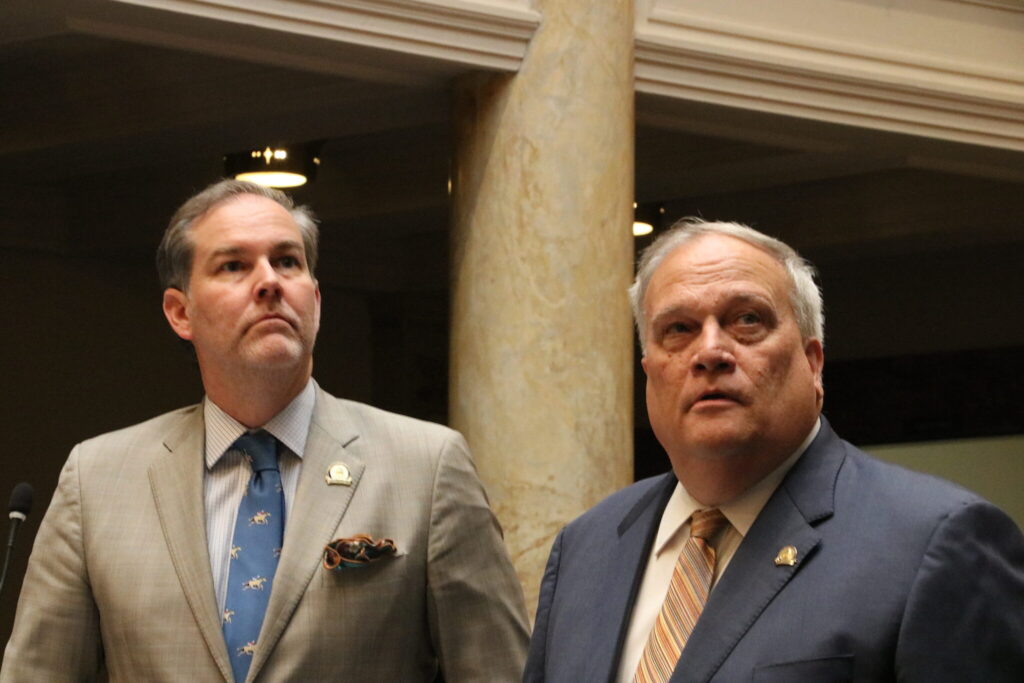FRANKFORT — With most of Democratic Gov. Andy Beshear’s vetoes overridden Republican lawmakers in the General Assembly have shown the power they wield over policy in Kentucky.
Legislators returned to Frankfort Thursday, the second to last day of the 2025 legislative session. Within hours, both the House and Senate overrode nearly all of Beshear’s 20-some vetoes, save for a few line items.
In his weekly press conference, Beshear highlighted his futile vetoes, as well as some of the bills he signed or let become law without his signature.

Beshear also aired grievances shared by some of his fellow Democrats in the General Assembly regarding what they see as a lack of transparency in the legislative process. He criticized Republicans for using “shell bills” or lengthy committee substitutes to quickly move legislation, particularly in the final days of the session. The governor said it is “designed to limit public review” of policy.
“We know that ain’t right,” Beshear said. “We know that we are always better with the sunshine, with the transparency, and I hope that this practice will be reduced or eliminated in the future.”
Last week, Republican leadership rebuked Democrats’ complaints about legislation being changed and moved with little notice, saying time is limited in a 30-day session.
Before Thursday, Beshear issued more than 20 vetoes and five line item vetoes to legislation. To override the governor, lawmakers must give final passage to vetoed bills by the end of Friday.
During floor debate on the veto override of House Bill 552, Republican Senate President Robert Stivers chided Beshear for not working with lawmakers on a trade commission between Kentucky and Ireland that was proposed in the bill.
“By constitution, it is this body and the one down the hall who makes the laws,” Stivers said, referring to the House of Representatives.
The Republican closed by pointing to the Republican supermajority in the legislature. The GOP has 31 of 38 Senate seats and 80 of the 100 House seats.
“People who see us — if they want to change the policy in this state, then they will change the makeup of this body,” Stivers said.
Here’s what is now Kentucky law
House Bill 2 allows Kentuckians to sue the governor over taxes paid on gold and silver bullion. In his veto message, Beshear decried the legislation as “unconstitutional” and said it was “out of touch with reality” for most Kentuckians who are feeling the strain of inflation at grocery stores and the gas pump. The Senate voted 31-6 to override the veto and allow the legislation to become law.
House Bill 4 eliminates diversity, equity and inclusion (DEI) initiatives at Kentucky’s public universities. Republicans have argued this session that such programs cause division on college campuses, while students and professors have testified DEI has made spaces for them in academia. Beshear signed his veto of the bill in front of advocates who opposed the bill and said it was “about hate.”
House Bill 6 limits state agencies in how they can issue administrative regulations and bolsters the authority of Kentucky’s legislative branch. Beshear argued in his veto message the bill “would likely stop and prevent the executive branch from implementing numerous bills passed by the General Assembly.” The House voted 80-20 to override the veto Wednesday afternoon.
House Bill 90 adds language to the state’s near total abortion ban in an attempt to clarify that doctors can intervene in complex pregnancies without fear of criminal punishment for violating the ban. Doctors have said the language fell short of that goal and confused them more than current law. In vetoing it, Beshear said it “threatens the life of pregnant women in Kentucky.”

House Bill 136 requires the Department of Corrections to include more data about people released from prison or on parole, including information like gang affiliations, time served and education levels. Beshear said in his veto message the bill would breach a contract by requiring a new communications service for inmates.
House Bill 216 allows some employees of the Department of Agriculture to apply for or receive funds or awards from the Kentucky Office of Agriculture Policy. No lawmakers voted against the bill in either the House and Senate. Beshear argued in his veto message the legislation would allow “conduct that has always been unethical and unlawful” under the executive branch’s ethics code.
House Bill 240, which has had bipartisan support from lawmakers, requires Kentucky kindergarten and first-grade students to take a universal screener before advancing to the next grade. Beshear used his veto message to push an issue he’s long preferred for improving learning for young students — universal pre-K programs. “House Bill 240 is not the answer,” Beshear wrote. “We should prepare, not punish, our youngest learners.”
House Bill 346 will prohibit the Louisville Metro Air Pollution Control District or the Kentucky Energy and Environment Cabinet from considering whether emergency stationary internal combustion engine emissions are subject to fees. Beshear in his veto message said it was “at least one entity’s attempt” to get a refund on emissions fees, fees that the bill would cause to fall on ratepayers. The House and Senate overrode his veto.
House Bill 398 will further limit state labor protections to a less-stringent federal standard, a move touted by Republican proponents as a business-friendly move but lambasted by labor unions as an “attack” on workers. Beshear in his veto message said HB 398 said On Thursday afternoon, the House voted 78-22 to overturn the veto. The Senate then voted 29-9 to overturn the veto, allowing it to become law. Two Republicans, Sen. Stephen West, R-Paris, and Sen. Michael Nemes, R-Sheperdsville, joined the minority of Democrats in voting against overriding the veto.
House Bill 399 makes interrupting a legislative proceeding a crime in Kentucky. Beshear argued in his veto message that sufficient laws are already on the books to cover such conduct.
House Bill 424 — Kentucky professors have warned this bill would erode academic tenure at the state’s public universities and colleges. The legislation would give universities and colleges the ability to remove faculty members and presidents for not meeting “performance and productivity requirements” set by the institutions’ boards. In his veto message Beshear said it “will limit Kentucky’s ability to hire the best people and threatens academic freedom.”
House Bill 495 cancels the Beshear administration’s restrictions on conversion therapy and prohibits Medicaid from covering transgender-affirming medical care. In his veto message, Beshear called it an “unconstitutional infringement” that “promotes a dangerous and discriminatory practice that has led to the deaths of Kentucky children.” Conversion therapy is a discredited practice that attempts to alter gender expression and sexual attraction that diverges from heterosexual normativity “with the specific aim to promote heterosexuality as a preferable outcome,” according to the The American Academy of Child and Adolescent Psychiatry.” In 2024, Beshear signed an executive order aimed at ending the practice on Kentucky minors.
House Bill 552 changes the makeup of local tourist and convention center commissions to allow a chief executive officer to appoint someone representing local businesses if no formal business association exists and creates the Kentucky-Ireland Trade Commission of the General Assembly. Beshear said in his veto message that the state Constitution gives the executive branch the authority to make such boards, but he would be willing to make a commission through an executive order.
House Bill 684 is a lengthy election rules bill that received bipartisan support.. However, Beshear vetoed the bill and noted in his veto message the legislation reverses a 2020 rule to allow voters to present a debit or credit card as proof of identification at the polls. He drew ire from Republican Secretary of State Michael Adams, who said on X the governor “just murdered bipartisan election reform.”
Public education advocates opposed House Bill 694, which made changes to the Kentucky Teachers’ Retirement System, saying it would undermine previous legislation. Beshear wrote in his veto message that he opposed the bill because it “breaks a promise made to teachers” without their input.
House Bill 695 requires the General Assembly’s OK for administration changes to Medicaid, will require able bodied adults ages 18-60 without dependents to work in order to get Medicaid health benefits, reinstates 2020-era prior authorizations for behavioral health and more. Beshear, who has supported Medicaid benefit expansions, vetoed it because, he said, it would “put up barriers to and delay health care for Kentuckians.”
Senate Bill 19 mandates a moment of silence at the beginning of school days and allows public schools to let students leave school for an hour a week for “moral instruction.” Beshear questioned how the bill could be enforced, as kindergarten students who do not stay silent could be violating the law. “At best, the bill will cause students to miss out on important instructional time,” Beshear wrote in his veto message. “At worst, it is subject to abuse and threatens the safety of Kentucky children.”
Senate Bill 28 will create a new economic development program within the Kentucky Department of Agriculture to promote agribusiness or the development of alternative fuels. Beshear in his veto message said the bill could lead to the secretary of the Cabinet for Economic Development to disclose confidential information on projects, and it was unconstitutional because the governor did not have any appointments to the board overseeing the program.
Senate Bill 65 will nullify two executive branch regulations involving Medicaid that were found deficient by a legislative committee last year. Beshear in his veto message called the bill an unconstitutional overreach by the legislature and said it was unnecessary because the regulations were already withdrawn.
Senate Bill 84 requires courts to interpret laws without deferring to a state agency’s interpretation of them and mirrors last year’s U.S. Supreme Court decision to strike down the precedent for the Chevron deference at the federal level. Beshear challenged the constitutionality of the bill, saying in his veto message it “violates the separation of powers” among Kentucky’s branches of government.
Senate Bill 89 will significantly roll back the state’s ability to regulate water pollution in the state by narrowing the definition of state waters that officials oversee. Republican proponents backing the bill said it would relieve industries from housing construction to coal mining from permitting barriers erected by the Kentucky Energy and Environment Cabinet.Environmental groups and Democrats lambasted the bill as opening up the state’s water resources to more pollution and potentially threatening Kentuckians’ drinking water.
Senate Bill 183 requires a proxy adviser contracted by a state retirement plan to complete an economic analysis before voting on or recommending a vote on a shareholder-sponsored proposal that is different from a board of directors’ proposal. Beshear wrote in his veto message the legislation undermines the authority of the Kentucky Public Pensions Authority.
Senate Bill 207, known as the School Innovation Act, allows public schools to seek exemptions from the Kentucky Board of Education from certain state laws or regulations. It also directs the board to consider if granting such waivers would hinder or improve “student academic achievement.” Beshear said the legislation would give the board “unfettered authority” to suspend Kentucky laws in his veto message.
Senate Bill 245 will require that pending reappointments to the Kentucky Fish and Wildlife Commission that are not confirmed by the Senate during a legislative session would have to vacate their position on the commission when the legislature adjourns for the year. For this year , it would only impact
Line item vetoes
House Bill 546 sets terms to fund the Local Assistance Road Program. Beshear vetoed part of the bill that would establish tolls for a planned I-69 Ohio River Crossing bridge to Indiana.
House Bill 566 makes additional changes to last year’s law creating the Kentucky Horse Racing and Gaming Corporation. Beshear had vetoed a few sections of the bill and said in his veto message he had concerns about a possible “significant conflict of interest” in how the corporation worked on the drafting of the bill.
Senate Bill 25 began as a shell bill, but later became a bill with multiple pieces of legislation in it toward the end of session. While the General Assembly overrode most of Beshear’s line item vetoes, some were sustained. That included a provision about how lawmakers will deliver legislation to the governor while they convene in a temporary structure while the Capitol is renovated in future sessions.
House Joint Resolution 30 would release funds for specific projects submitted by drinking water and wastewater utilities through a program created by the legislature and managed by the Kentucky Infrastructure Authority. Beshear vetoed parts of the bill to give two specific projects “flexibility” in being completed in more efficient ways proposed by the Kentucky Energy and Environment Cabinet.
House Joint Resolution 46 — This resolution sets up a list of priority projects for county roads. Beshear issued some line item vetoes to correct the names of some listed roads, but the House overrode the veto 80-20. Lawmakers created the resolution based on a list previously provided by the Kentucky Transportation Cabinet.
This article is republished under a Creative Commons license from Kentucky Lantern, which is part of States Newsroom, a network of news bureaus supported by grants and a coalition of donors as a 501c(3) public charity. Kentucky Lantern maintains editorial independence. Contact Editor Jamie Lucke for questions: info@kentuckylantern.com. Follow Kentucky Lantern on Facebook and Twitter.
McKenna Horsley covers state politics for the Kentucky Lantern. She previously worked for newspapers in Huntington, West Virginia, and Frankfort, Kentucky. She is from northeastern Kentucky.
Sarah Ladd is a Louisville-based journalist and Kentuckian. She has covered everything from crime to higher education. In 2020, she started reporting on the COVID-19 pandemic and has covered health ever since.
Liam Niemeyer covers government and policy in Kentucky and its impacts throughout the Commonwealth for the Kentucky Lantern. He most recently spent four years reporting award-winning stories for WKMS Public Radio in Murray.








